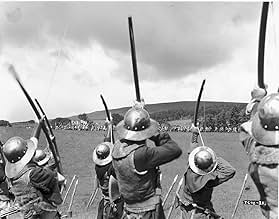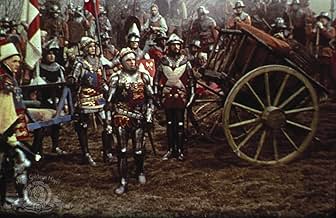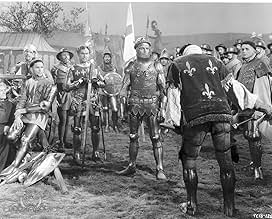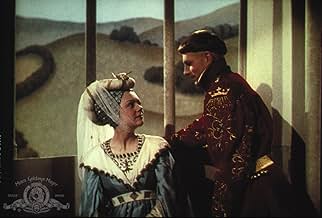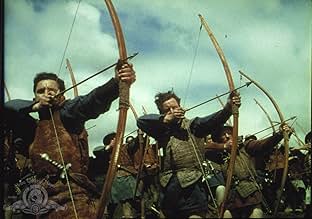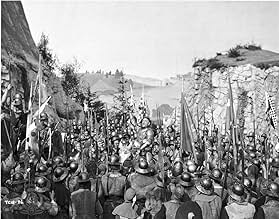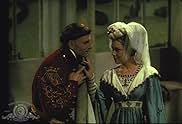Heinrich V.
Originaltitel: The Chronicle History of King Henry the Fifth with His Battell Fought at Agincourt in France
IMDb-BEWERTUNG
7,0/10
7473
IHRE BEWERTUNG
Füge eine Handlung in deiner Sprache hinzuIn the midst of the Hundred Years' War, the young King Henry V of England embarks on the conquest of France in 1415.In the midst of the Hundred Years' War, the young King Henry V of England embarks on the conquest of France in 1415.In the midst of the Hundred Years' War, the young King Henry V of England embarks on the conquest of France in 1415.
- Für 4 Oscars nominiert
- 12 Gewinne & 6 Nominierungen insgesamt
Empfohlene Bewertungen
Olivier was asked by his government to make this film during the second world war to raise the morale of civilians and troops alike. He abstained from showing excessive blood and gore, used the language of Shakespeare brilliantly and achieved his mission. I have seen this film many times and it never fails to thrill me. The story line is commonly known, we know how happily it came out in the end. It was the first Shakespearian play made on film in color and enthralled all who saw it.
With tensions between England and the arrogant French pushed to breaking point, King Henry the Fifth sets out with his armies to conquer and quell the French in their native land. The film builds up with to the historic battle of Agincourt with the troops and the king camping together and making progress across the land.
Whenever Henry V (to use the shorten title) comes on TV I always tape it simply because I always assume that it is a masterpiece of English cinema such is it's reputation in many circles. However this reputation may not be that well deserved as I have decided from my viewing of it today. The plot is Shakespeare and I will not criticise it, but I know myself that it is not a story that I would pick if asked to chose from his canon of work I prefer the darker stuff or the out and out comedies. That aside the film tells a straightforward tale, here used to raise morale and fly the flag of Britain and England during WWII. As such it works but I needed it to be more than just a flag waving exercise, I wanted more detail and more thought. Such scenes exist within the play but Olivier does not use them as well as he uses the grandstanding speeches and battle scene his focus is not on thought but on scale.
As director he does quite well in early stages and in the actual battle itself. The device of opening ad closing in the playhouse works to good effect and is clever but far too many scenes have poor camera angles or are poorly framed. The battle scene is good but too much of the film is ordinary in terms of looks and style. As actor Olivier carries the King well but is too one dimensional for me and I didn't have to put any thought into him to watch the film. He holds back for much of the film but leaps up for more upbeat scenes or rousing speeches. The support cast all sound natural with the dialogue although some of the roles are a little bit hammy, they still hold the film together well.
Overall this is an enjoyable film that has good spectacle to it and key scenes are very good. However the lack of anything under the surface is a problem and it is one of the lesser Shakespearean adaptations I have seen. Still worth a look but if you're like me, you'll be left wondering `was that it?'
Whenever Henry V (to use the shorten title) comes on TV I always tape it simply because I always assume that it is a masterpiece of English cinema such is it's reputation in many circles. However this reputation may not be that well deserved as I have decided from my viewing of it today. The plot is Shakespeare and I will not criticise it, but I know myself that it is not a story that I would pick if asked to chose from his canon of work I prefer the darker stuff or the out and out comedies. That aside the film tells a straightforward tale, here used to raise morale and fly the flag of Britain and England during WWII. As such it works but I needed it to be more than just a flag waving exercise, I wanted more detail and more thought. Such scenes exist within the play but Olivier does not use them as well as he uses the grandstanding speeches and battle scene his focus is not on thought but on scale.
As director he does quite well in early stages and in the actual battle itself. The device of opening ad closing in the playhouse works to good effect and is clever but far too many scenes have poor camera angles or are poorly framed. The battle scene is good but too much of the film is ordinary in terms of looks and style. As actor Olivier carries the King well but is too one dimensional for me and I didn't have to put any thought into him to watch the film. He holds back for much of the film but leaps up for more upbeat scenes or rousing speeches. The support cast all sound natural with the dialogue although some of the roles are a little bit hammy, they still hold the film together well.
Overall this is an enjoyable film that has good spectacle to it and key scenes are very good. However the lack of anything under the surface is a problem and it is one of the lesser Shakespearean adaptations I have seen. Still worth a look but if you're like me, you'll be left wondering `was that it?'
"Henry V" is poetry within the historical context of English patriotic pageantry. At the beginning, we are asked to imagine "a kingdom for a stage, princes to act and monarchs to behold the swelling scene." Directed by Laurence Olivier, the film begins in the enclosed intimacy of a studio-created Globe Theatre, performed before an appropriately attired Elizabethan audience. However, Olivier then uses the medium of Cinema to physically "open up" the play as it progresses from scene to scene, increasingly taking advantage of more and more elaborate studio scenery and lighting and mattes, ultimately using vast exterior locations for the climactic Battle of Agincourt.
Olivier, in the lead role, is a forceful King Harry, but his work and imagination behind the camera are stunning, especially for a first-time director. The humor of the fumbling "unraised spirits" who impersonate the roles of the Archbishop of Canterbury (Felix Aylmer) and the Bishop of Ely (Robert Helpmann) is an early surprise, as is the coarse high-jinks of Robert Newton's interpretation of Pistol, chewing up the scenery and everything in sight.
As a director, Olivier transforms the conventions of the stage. He shows us a fleet of miniature warships engulfed in an English Channel fog, a Chorus (Leslie Banks) superimposed against painted, moving backdrops, and, toward the end, the bleak French post-battle countryside - a zone of pillage, poverty, and heartbreak in the aftermath of battle.
This version of "Henry V" was made with a wartime audience in mind. (The 'V' in the title is a perfect symbolic reference for the times.) Here, the overconfident Dauphin (Max Adrian) and other French nobles stand in for authoritarianism; and the common men who make up the motley army of British archers and infantry represent their enemy -- and ultimately the victors.
Olivier, in the lead role, is a forceful King Harry, but his work and imagination behind the camera are stunning, especially for a first-time director. The humor of the fumbling "unraised spirits" who impersonate the roles of the Archbishop of Canterbury (Felix Aylmer) and the Bishop of Ely (Robert Helpmann) is an early surprise, as is the coarse high-jinks of Robert Newton's interpretation of Pistol, chewing up the scenery and everything in sight.
As a director, Olivier transforms the conventions of the stage. He shows us a fleet of miniature warships engulfed in an English Channel fog, a Chorus (Leslie Banks) superimposed against painted, moving backdrops, and, toward the end, the bleak French post-battle countryside - a zone of pillage, poverty, and heartbreak in the aftermath of battle.
This version of "Henry V" was made with a wartime audience in mind. (The 'V' in the title is a perfect symbolic reference for the times.) Here, the overconfident Dauphin (Max Adrian) and other French nobles stand in for authoritarianism; and the common men who make up the motley army of British archers and infantry represent their enemy -- and ultimately the victors.
It's a splendid rendering based on Shakespeare play with a nice staging , dealing with the warrior king Henry V and his grand victory at the battle of Agincourt on St. Crispin's Day, October 15, 1415 . The movie begins with an ingenious initiation , the camera from a first general shot on the background lead us until a foreground where some actors are playing at the Glove theater in 1600 , then several dramatic scenes take place and eventually going back to the Globe for the final scenes . The film is alrightly based on historic events well made by filmmaker and star Sir Laurence Olivier. They are the following ones : Henry V vanquishes Charles VI in Agincourt (1415) and took over Normandy . Charles VI of France signs Troyes treatise in what Henry V is wedded to Charles's daughter . His descendant Heny VI of England will proclaim himself King of France but Charles VII (anterior Delphin) will be crowned king of France in Reims and the ¨100 years war¨ going on until 1453 (date of downfall Byzance).Grand staging of the Shakespearean play of King Henry V .
This is the first of three principal movies directed by Laurence Olivier along with ¨Hamlet¨ and ¨Richard III¨ based on Shakespeare plays . It's an astounding , stirring , stunning and thoughtful film with glimmer , glittering , colorful cinematography and splendid costume . Partly intended as a wartime morale-booster for the British . Certain parts of the play were consequently omitted , such as Henry's hanging of a friend as an example of firm justice . Laurence Olivier won a honorary and special Oscar for his producing , directing and acting in bringing English history part to vivid life of the screen made with pageantry and perfection . The excellent secondary cast is completed with usual players of the English stage theater and films with important careers : Leo Genn (Quo Vadis) , Leslie Banks (Jamaica inn) , Robert Newton (Treasure's island) , Ralph Truman (El Cid) , Felix Aylmer (Ivanhoe) , Ernest Thesiger (Bride of Frankestein) , Neal McGinnis (Jason and the Argonauts) , Freda Jackson (Brides of Dracula). The especial departments are outstanding , thus : Robert Furse in wardrobe and costumes , the classical musician William Walton and the photographer of superproductions Robert Krasker . Rating : Good and notable . Well worth seeing.
This is the first of three principal movies directed by Laurence Olivier along with ¨Hamlet¨ and ¨Richard III¨ based on Shakespeare plays . It's an astounding , stirring , stunning and thoughtful film with glimmer , glittering , colorful cinematography and splendid costume . Partly intended as a wartime morale-booster for the British . Certain parts of the play were consequently omitted , such as Henry's hanging of a friend as an example of firm justice . Laurence Olivier won a honorary and special Oscar for his producing , directing and acting in bringing English history part to vivid life of the screen made with pageantry and perfection . The excellent secondary cast is completed with usual players of the English stage theater and films with important careers : Leo Genn (Quo Vadis) , Leslie Banks (Jamaica inn) , Robert Newton (Treasure's island) , Ralph Truman (El Cid) , Felix Aylmer (Ivanhoe) , Ernest Thesiger (Bride of Frankestein) , Neal McGinnis (Jason and the Argonauts) , Freda Jackson (Brides of Dracula). The especial departments are outstanding , thus : Robert Furse in wardrobe and costumes , the classical musician William Walton and the photographer of superproductions Robert Krasker . Rating : Good and notable . Well worth seeing.
This is a brilliantly conceived movie-within-a-play-within-a-movie that showcases the genius of Laurence Olivier. Today's audiences are exposed mainly to Olivier the movie actor. But if you want to see a purer form of acting, see Olivier the stage actor. This is possible by watching his Shakespeare plays on film. And these films are by Olivier the "auteur," long before the term was coined. Olivier's is the legacy to which Branaugh and others, who essay Shakespeare on film, must live up to.
And lest you're expecting a camera pointed at a stage, don't worry. Olivier, who produced and directed most of his Shakespeare films, has actually used the film medium to enlarge his plays' visual scope, while maintaining the intimacy that is the essence of live theatre. Also, Olivier is mindful of how daunting the language of Shakespeare is for modern audiences and has modified much of the original script to be more comprehensible, while preserving the feel of Elizabethan English.
Olivier's "Henry V" was to England what Eisentein's "Ivan the Terrible" was to Russia a familiar history rendered as a national epic, for morale purposes, while audiences were fighting off the Germans during World War II. There are other parallels. For example, both use static, formalized composition, in Henry V's case meant to resemble the images in medieval illuminated manuscripts and books of Hours. (In Ivan's case, according to Pauline Kael, like Japanese Kabuki.) Thus, a sound stage "exterior" backdrop becomes a tableau that serves to enhance, with its flat perspective and subjective scale, the view we have of that fabulous Age of Chivalry for which the play's Battle of Agincourt was the closing act.
I've always scoffed at the extravagant accolades which show business gives its own. But after seeing this film, or his equally brilliant "Hamlet," I can understand why Laurence Olivier was so good, that a knighthood wasn't enough, and so he was raised to the peerage.
And lest you're expecting a camera pointed at a stage, don't worry. Olivier, who produced and directed most of his Shakespeare films, has actually used the film medium to enlarge his plays' visual scope, while maintaining the intimacy that is the essence of live theatre. Also, Olivier is mindful of how daunting the language of Shakespeare is for modern audiences and has modified much of the original script to be more comprehensible, while preserving the feel of Elizabethan English.
Olivier's "Henry V" was to England what Eisentein's "Ivan the Terrible" was to Russia a familiar history rendered as a national epic, for morale purposes, while audiences were fighting off the Germans during World War II. There are other parallels. For example, both use static, formalized composition, in Henry V's case meant to resemble the images in medieval illuminated manuscripts and books of Hours. (In Ivan's case, according to Pauline Kael, like Japanese Kabuki.) Thus, a sound stage "exterior" backdrop becomes a tableau that serves to enhance, with its flat perspective and subjective scale, the view we have of that fabulous Age of Chivalry for which the play's Battle of Agincourt was the closing act.
I've always scoffed at the extravagant accolades which show business gives its own. But after seeing this film, or his equally brilliant "Hamlet," I can understand why Laurence Olivier was so good, that a knighthood wasn't enough, and so he was raised to the peerage.
Wusstest du schon
- WissenswertesThe opening model shot of London was huge, 50 feet by 70 feet in size, and made of plaster. It took four months to construct.
- PatzerHenry V's reign was in the early 1400s, but most of the costuming in the film is from 1600, the time of the plays writing, almost 200 years later. The armor on the other hand is accurate. In fact, there is no anachronism in the costumes. The story is told from two points of view (one in the 1600s, as a performance in the Globe Theater; the other in the 1400s, as the characters originally lived). Costumes shift on purpose according to the point of view.
- Zitate
King Henry V of England: Tell the Dauphin his jest will savor but of shallow wit, when thousands weep more than did laugh at it.
- Crazy CreditsThe main title not only gives the full title of the play as William Shakespeare wrote it, but spells the words in the 16th-century manner, not in modern spelling.
- Alternative VersionenIn the American release of the film, all references to "bastards" in the dialogue were excised.
- VerbindungenEdited into Robur - Der Herr der sieben Kontinente (1961)
- SoundtracksAgincourt Hymn (Deo gracias Anglia)
(uncredited)
Latin hymn text set to anonymous tune (1415)
Arranged by William Walton
Top-Auswahl
Melde dich zum Bewerten an und greife auf die Watchlist für personalisierte Empfehlungen zu.
- How long is Henry V?Powered by Alexa
Details
Box Office
- Budget
- 475.000 £ (geschätzt)
- Weltweiter Bruttoertrag
- 62.619 $
- Laufzeit2 Stunden 17 Minuten
- Sound-Mix
- Seitenverhältnis
- 1.37 : 1
Zu dieser Seite beitragen
Bearbeitung vorschlagen oder fehlenden Inhalt hinzufügen



